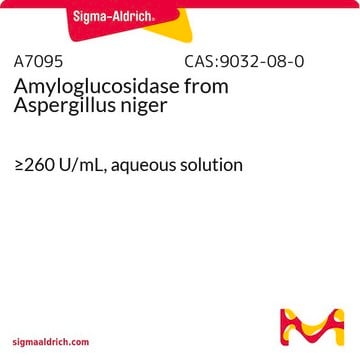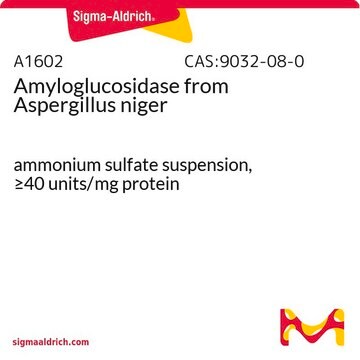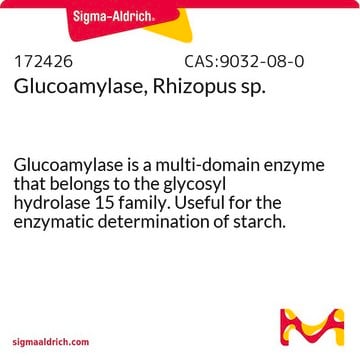A9228
Amyloglucosidase from Rhizopus sp.
≥40,000 units/g solid
Sinónimos:
1,4-α-D-Glucan glucohydrolase, Exo-1,4-α-glucosidase, Glucoamylase
About This Item
Productos recomendados
form
lyophilized solid
Quality Level
specific activity
≥40,000 units/g solid
solubility
0.03 M sodium citrate-phosphate buffer, pH 4.5: soluble 5.0 mg/mL
storage temp.
−20°C
¿Está buscando productos similares? Visita Guía de comparación de productos
Categorías relacionadas
Application
Biochem/physiol Actions
Unit Definition
Physical form
signalword
Danger
hcodes
pcodes
Hazard Classifications
Resp. Sens. 1
Storage Class
11 - Combustible Solids
wgk_germany
WGK 3
flash_point_f
Not applicable
flash_point_c
Not applicable
ppe
Eyeshields, Gloves, type N95 (US)
Certificados de análisis (COA)
Busque Certificados de análisis (COA) introduciendo el número de lote del producto. Los números de lote se encuentran en la etiqueta del producto después de las palabras «Lot» o «Batch»
¿Ya tiene este producto?
Encuentre la documentación para los productos que ha comprado recientemente en la Biblioteca de documentos.
Los clientes también vieron
Protocolos
This procedure may be used for the determination of Amyloglucosidase activity using starch as the substrate.
Nuestro equipo de científicos tiene experiencia en todas las áreas de investigación: Ciencias de la vida, Ciencia de los materiales, Síntesis química, Cromatografía, Analítica y muchas otras.
Póngase en contacto con el Servicio técnico












